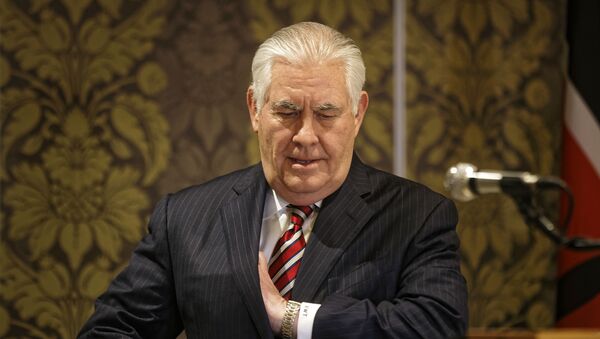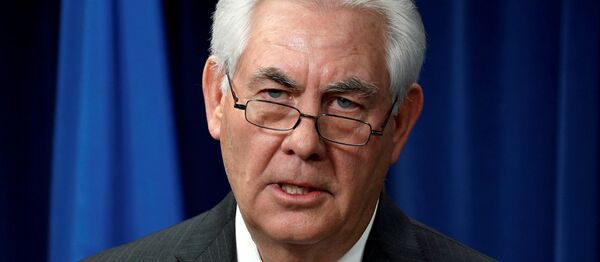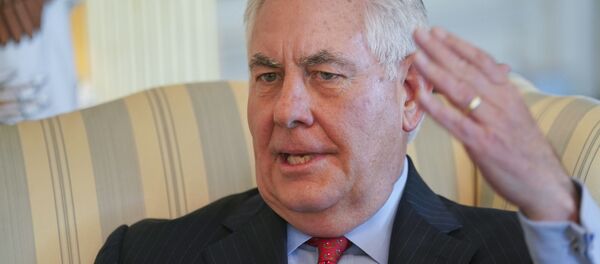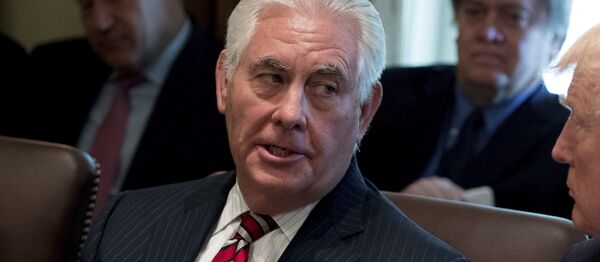Formerly the CEO of the ExxonMobil oil company, Tillerson effectively failed to become a team player in Trump's administration. Trapped between the impulsive persona of the Donald himself and numerous "Russian meddling" investigations, Tillerson had to overcome resistance from several centers of power at the same time.
Russia
With the US already riding a wave of anti-Russian hysteria in 2016, there is little surprise that Tillerson was immediately dubbed a "friend of Putin" and a "Russian puppet." Even before the US Senate approved him as secretary of state, many members of Congress pointed out his "ties" with Russia.
It is neither secret nor surprising that Tillerson visited Russia often. ExxonMobil had contracts with Russian oil company Rosneft that involved drilling operations in the Arctic. In 2013, Russian President Vladimir Putin awarded Tillerson the Order of Friendship. Considering the anti-Russian witch hunt in 2016, this award must have looked like the mark of the devil himself.
However, once in office, the Russiagate investigations effectively paralyzed Tillerson as the US's chief diplomat. His intention — and that of the Trump administration in general — to develop an independent course toward Moscow was stillborn, as the investigations into supposed Russian meddling in the November 2016 US elections, as well as accusations of direct collusion between Russian officials and members of Trump's election campaign, pre-determined the way the State Department could approach Moscow.
While both Tillerson and his counterpart, Russian Foreign Minister Sergei Lavrov, said they have no problems in their personal relations and were both open to dialogue, Tillerson failed to strengthen ties with Russia and establish a pragmatic conversation because of ongoing US sanctions. When the US Congress approved the Countering America's Adversaries Through Sanctions Act in the summer of 2017, which grouped Russia together with other American betes noires Iran and North Korea, the last hope for dialogue on the most sensitive problems was lost.
North Korea
It was not Russia, however, where Trump and Tillerson disagreed most. During the peak of the US-North Korea standoff, when the US sought to exert "maximum pressure" on Pyongyang, Trump publicly slammed Tillerson for "wasting his time" trying to negotiate with the regime. While Tillerson apparently tried to find some diplomatic back channel to contact the Democratic People's Republic of Korea, Trump used his Twitter account to post public threats to destroy the country in colorful expressions.
…Save your energy Rex, we'll do what has to be done!
— Donald J. Trump (@realDonaldTrump) 1 октября 2017 г.
Curiously, Trump named himself the winner when North Korea's leader, Kim Jong Un, agreed to meet and negotiate in March 2018. Mere hours after Tillerson's resignation was announced Tuesday, the White House spokesperson openly told journalists that Trump "wanted a new team ahead of the North Korea talks," further proving the two officials' disagreements on the Korean issue.
In Afghanistan, too, Trump and Tillerson were at odds. Trump's new strategy on Afghanistan implied not only keeping the troops on the ground, but also increasing the military contingent in the country.
"We will push onward to victory," Trump said in a televised address in August 2017. "Our troops will fight to win."
However, Trump's state secretary walked back some of that rhetoric at a press conference later that month, saying, "I think the president was clear: this entire effort was intended to put pressure on the Taliban, to have the Taliban understand that you will not win a battlefield victory… We may not win one, but neither will you."
"We may have also just learned the real goal of the Afghanistan strategy," a Vox report at the time read.
The two other points of disagreement were Venezuela, where Trump did not exclude a military solution but Tillerson advocated a diplomatic approach, and the United States' exit of the Paris Climate Agreement, on which Tillerson also publicly disagreed with Trump's decision.
Is it personal?
The conflict between Tillerson and Trump has even spilled into more personal territory, such as when Tillerson reportedly called Trump a "moron" during a July 20, 2017, meeting with Trump's cabinet and security team.
Trump subsequently called the NBC report on that incident "fake news" and expressed "total confidence" in Tillerson, only to later suggest that he "compare IQ tests" with the diplomat.
"I think it's fake news, but if he did that, I guess we'll have to compare IQ tests. And I can tell you who is going to win," Trump sain in an interview with Forbes. The White House spokesperson later downplayed the president's words as a joke.
Their personalities also arguably played a role: Tillerson is a pragmatic, reserved leader of a large oil company, who is used to weighing his words, while Trump is a showman: master of epatage and adventurous deals, quick to call names.
"Sometimes I'd like Rex Tillerson to be a little bit tougher," Trump said in October 2017.
Tillerson's departure is as ambiguous as the two officials' relations. On the one hand, Trump fired Tillerson "via Twitter," not in a personal meeting. On the other hand, Trump was rather reserved (by Trump standards, of course) when he talked to journalists about Tillerson's departure.
"I respect his intellect. I respect the process that we've all gone through together. We have a very good relationship. For whatever reason, chemistry, whatever it is. Why do people get along? I've always — right from the beginning, from day one, I've gotten along well with Mike Pompeo," he said Tuesday, referring to the erstwhile director of the CIA, who is to be Tillerson's replacement.





